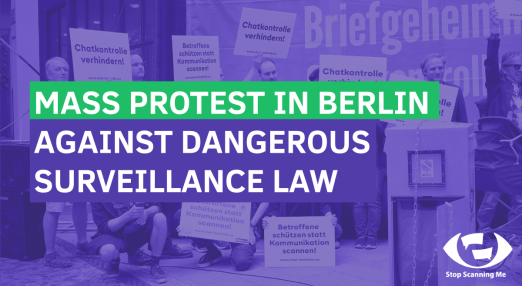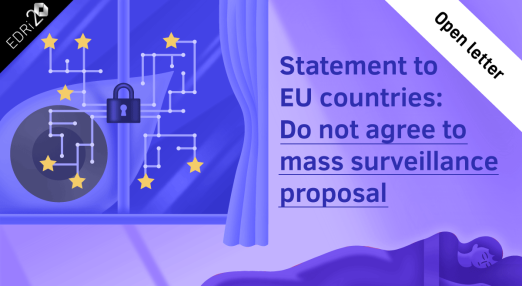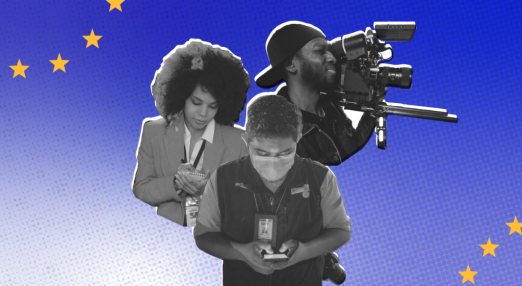Privacy and data protection
Privacy and data protection are essential for us to live, connect, work, create, organise and more. Governments and companies have long used mass surveillance for control trying to legitimise snooping for health, security or other reasons. The near-total digitisation of our lives has made it easier to control, profile and profit from our attention, data, bodies and behaviours in ways that are very difficult for us to understand and challenge. European data protection standards such as the GDPR are a good step forward but we need more to effectively ensure enforcement and protection against unlawful surveillance practices.
Filter resources
-

The Stop Scanning Me movement organised a mass protest in Berlin against dangerous surveillance law
The German alliance against chat control "ChatkontrolleSTOPPEN!" mobilised people in a protest against the European Commission's mass surveillance plans under the Child Sexual Abuse Regulation (CSAR). The action took place during the visit of the European Union Interior Commissioner to the conference of the German Interior ministers in Berlin.
Read more
-

Council of Europe must not water down their human rights standards in convention on AI
In a joint statement, civil society calls for a broad scope and definition of AI systems and no blanket exemptions for AI systems for national defence/national security.
Read more
-

EDRi-gram, 13 September 2023
Are you ready to catch up on the recent digital rights developments in Europe after a nice summer break? The latest EDRi-gram has got you covered. From a fake social network that is spooking people in Warsaw to activists celebrating encryption, this edition brings you the hottest updates on everything digital. Stay informed and up to speed with the latest digital rights updates in Europe.
Read more
-

Open letter: EU countries should say no to the CSAR mass surveillance proposal
Today, EDRi and 81 organisations have sent an open letter to EU governments to once again urge them to say no to the CSA Regulation until it fully protects online rights, freedoms, and security.
Read more
-

Party-cipate and #CelebrateEncryption
Now is the time to show your support for encryption and influence the European Parliament to do better for children and everyone else. Join the #CelebrateEncryption action and share photos of you and your friends promoting privacy and celebrating encryption.
Read more
-

European Parliament’s CULT committee set to greenlight controversial amendment to the EMFA in today’s vote
The European Parliament’s CULT committee is set to vote on the EMFA. The committee is likely to approve the contentious 24-hour must-carry amendment that could make it harder to fight disinformation, and would undermine the Digital Services Act.
Read more
-

EU legislators must close dangerous loophole and protect human rights in the AI Act
Over 115 civil society organisations are calling on EU legislators to remove a major loophole in the high-risk classification process of the Artificial Intelligence (AI) Act and maintain a high level of protection for people’s rights in the legislation.
Read more
-

Is this the most criticised draft EU law of all time?
An unprecedentedly broad range of stakeholders have raised concerns that despite its important aims, the measures proposed in the draft EU Child Sexual Abuse Regulation are fundamentally incompatible with human rights.
Read more
-

Meta pledges to ask EU users for consent before showing behavioural ads
In a surprise announcement last Tuesday, Meta made the long overdue promise to finally ask its users for their consent before showing them behavioral ads – at least if they live in the European Union, EEA or Switzerland.
Read more
-

Digital ID – civil society demands protection of Users
One single app to rent a hotel room, prove your age, your educational, financial or health certificates, or to access digital public and private services? Sounds convenient? Well, it is. But if done wrong, it will be equally easy for corporations, authorities or even bad actors to create highly detailed profiles about yourself – spanning a vast area of your everyday life – or abuse this treasure of sensitive personal information in other ways.
Read more
-

Regulating Big Tech in Europe with the Digital Services Act & Digital Markets Act
The EU’s latest flagship laws Digital Services Act (DSA) and Digital Markets Act (DMA) are in force, the regulatory structure is (slowly) being set up, the first Big Tech companies are suing in court, and the European Commission throws a party (yes, really). But what does this mean for people in their role as platform users and what’s coming next?
Read more
-

Council poised to endorse mass surveillance as official position for CSA Regulation
The Council of EU Member States are close to finalising their position on the controversial CSA Regulation. Yet the latest slew of Council amendments – just like the European Commission’s original – endorse measures which amount to mass surveillance and which would fundamentally undermine end-to-end encryption.
Read more
